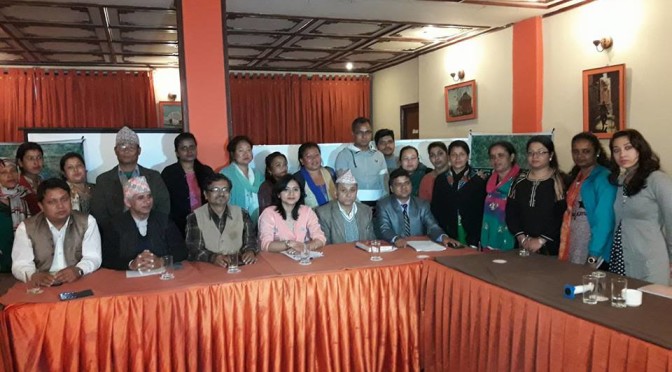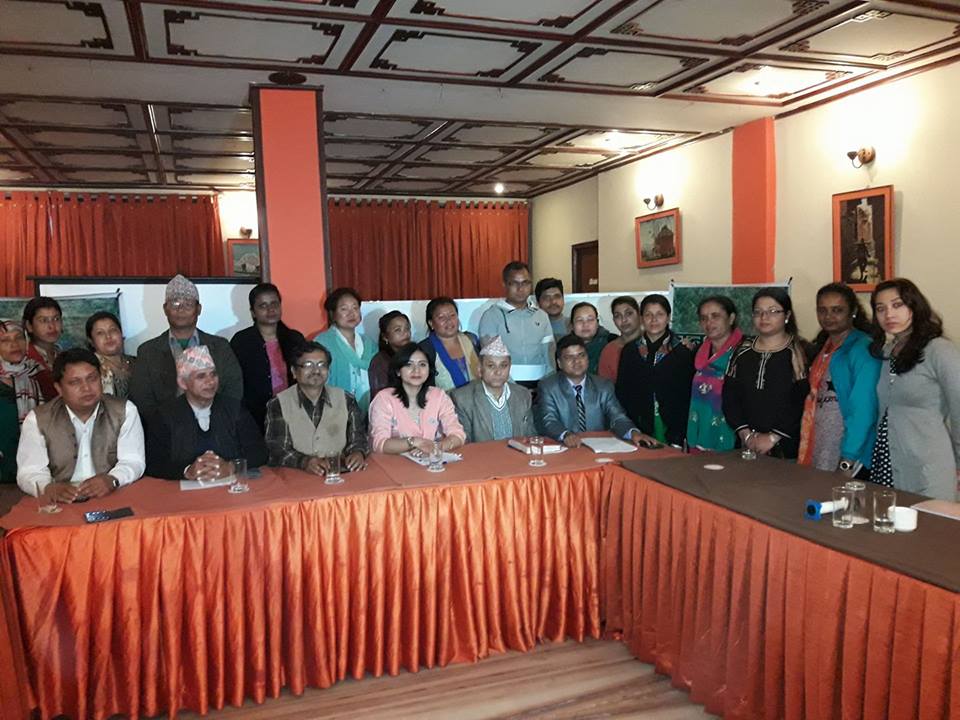KATHMANDU, NEPAL – Forty six representatives of farm and forest producer organizations and community forest user groups in Nepal gathered last March 28 in Kathmandu to share knowledge and experiences on sustainable forestry and forest management, identify common policy advocacy issues they can bring to government and establish partnership for taking action together.
The “Knowledge Exchange on Sustainable Forestry and Forest Management” was organized by the Asian Farmers’ Association for Sustainable Rural Development (AFA), National Land Rights Forum (NLRF), Central Tea Cooperative Federation (CTCF) Nepal, Federation of Community Forestry Users, Nepal (FECOFUN) and All Nepal Peasants’ Federation (ANPFa) with support from FAO’s Forest & Farm Facility (FFF).
National Farmers Group’s Federation Chairperson Uddhab Adhikari said during the forum that while community forest practices in Nepal have contributed to an increase in its forest cover to 44% in recent decades, the government still has not programmatically understood the inextricable relation of communities with forests and has not given sufficient community access to land, forest and water resources as a basic human right that can help improve the lives of poor, landless and small women and men farmers.
He added that “the poor and landless are often seen as destroyers of forests and are cruelly evicted, while the rich and powerful capture public places and forests” and emphasized the need for policy makers, farm producers and community forest user groups to come together to address these conflicts and to promote agro-farming to improve livelihoods of community people who directly depend on forests.
Association of Family Forest Organization of Nepal Chairperson Jogaraj Giri said that community forests policies that were intended to bring social and economic development of women, the poor and the marginalized have brought about positive outcomes in terms of sustainable forest management, but he pointed out that government is promoting corporate farming, wild life conservation and bio-diversity, while forest and farm producer organizations are focused on conservation through full community participation, access of marginalized communities to natural resources for their livelihood, and sustainable forest management through a bottoms-up approach.
He pointed out that “with the changing context in Nepal characterized by a shift of power from central to local, there is tremendous opportunity to establish community rights to natural resources like forest, land and water” but there must be strategy to avoid reducing community rights to sustainable forest management and its delegation to provincial and not the local level.
FECOFUN General Secretary Bharati Pathak said that Nepal’s community forestry practices are the most successful in the world and there are many useful policies for promoting livelihoods of poor and marginalized such as the provision on 50% participation of women in community forest user groups and the utilization of 35% of their annual income for poor users’ livelihood improvement, but the challenge is in the implementation as the government has no real monitoring mechanism to measure their effectiveness, so they often only exist on paper.
She emphasized the need to “set up a strategy to implement these policies and make government accountable by empowering community people as they are the ones who preserve, need and love the forest, so there can be no one more sincerely responsible for protecting their natural resources” and said that FECOFUN is now focused on community property rights and finding the link between forests and farms by analysing national and international experiences, treaty and agreements in the context of Nepal.
She added that community forest user groups do not want to evict real landless people, but there is another challenge of the forests being captured by others, and that the conflict has to be solved by government with favourable policy formulation and institutions and FECOFUN is ready to collaborate in this way.
Right to Food Network Dr. Keshab Khadka of ANPFa said that the increase in Nepal’s forest cover from 19% to 44% is laudable but there remains the problem of eviction by marginalized people whose livelihood prospects have not been incorporated in resource utilization that contributes to sustainable forest management.
He pointed out that “social organizations have not united in a common agenda and have separately advocated for water, land and forests with limited results” and urged like-minded organizations to cooperate on initiatives to establish community right on sustainable natural resource management including knowledge sharing, capacity enhancement and joint advocacy on common issues.
National Land Rights Forum former Chairperson Som Prasad Bhandari said that proper alternatives are needed to stop forceful eviction from forest areas, such as supporting the Managed Settlement Commission to identify the real needy people living in the forest while the community forest user groups can give provide user cards to the landless who are deprived of access to forest products.
He emphasized that “minimum 35% annual income of community forest user groups must be utilized for landless, dalits and small farmers who are categorized in the lowest rank as provided by the government policy” and also called for collaboration among like-minded organizations to come up with a joint policy influence strategy to intervene with policy makers on favourable policies for the communities they are working for.
Participants identified several challenges such as lack of clear policy on agroforestry, the common understanding of community forests as being for conservation only and not for utilization, leadership of most community forest user groups by socio-economically strong persons such as male upper-caste political leaders.
They also identified opportunities such as the draft of an agroforestry guideline, the existence of a Managed Settlement Commission, and the signing on of the government to the Voluntary Guidelines on the Responsible Governance of Tenure of Land, Fisheries and Forests in the Context of National Food Security.
They also cited many experience that can be built upon such as the agroforestry program being conducted by FECOFUN with support by the Forest and Farm Facility, the agro-forest support program supported by IUCN which focuses on agro-based entrepreneurship, and the linking of community property rights and community land reform by NLRF.
During the workshop that followed the presentations and discussions, participants identified the following issues and concerns that they want to raise to government:
– Full utilization and conservation rights of communities toward natural resources
– Sustainable livelihood issues of landless, women and small farmers, and forest based marginal communities
– Policy for forest-based farm production like herbs, fruits, livestock, and high value crops
– Appropriate compensation of wild life attacks on farm production and human lives
– Favourable policies on natural resources (water, land and forest) for poor, landless, women and small holder farmers.
– Ensuring that benefits of carbon trade go directly to communities
They also agreed to the following partnerships that can be established on sustainable forestry and forest management in Nepal:
– Joint campaign for the 35% budget utilization to address the livelihood issues of poor, landless, marginalized and small holder farmers in community forest user groups
– Integrated advocacy strategy of like-minded organizations on the issues of landless, small holder and women farmers, and marginalized communities related to forest, land, agriculture and water
– Knowledge exchange and capacity building between organizations and with targeted communities
– Common position and advocacy on the policy formulation process of government on common issues
– Initiatives to enhance community resilience to climate change and skills upgrade for communities to benefit from agroforestry
There was also a talk show and a sharing of experiences from the field visit of some forest and farm producer organizations during the forum (to be reported in separate articles). ###





Comments are closed